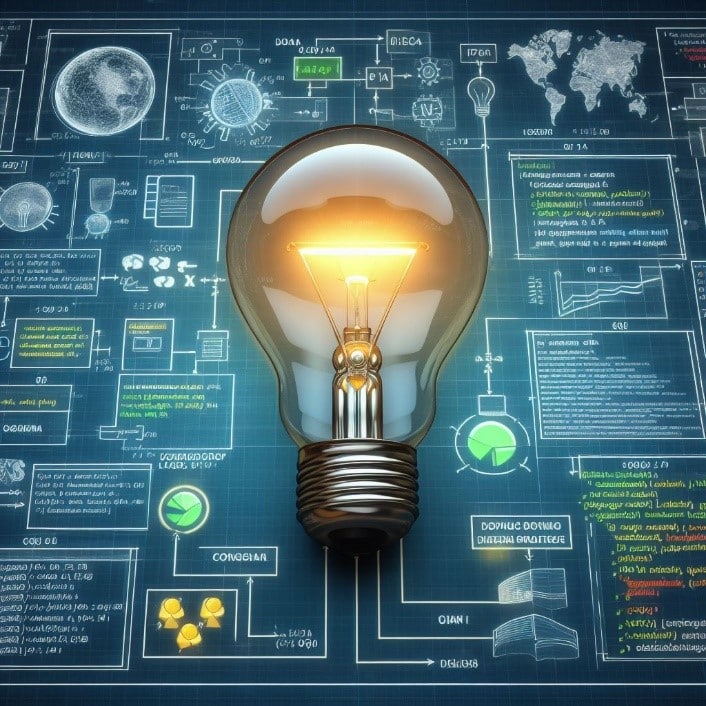
This article summarizes aspects of algorithm and software patents and suggests factors for lawyers to consider when retaining an expert in this field.
Algorithms and their use in Software
An algorithm is a set of mathematical instructions or rules that define a sequence of operations. Algorithms can be simple, like those that add numbers in a list, or complex, such as those that manage data in large databases or control the flight of a drone.
A software patent, on the other hand, pertains to a broader scope that may include a specific type of algorithm but extends to the entire system that implements the algorithm, including user interfaces, operating environments, and the underlying hardware interactions. Within software, an algorithm is instantiated in a language such as Python, Java, C++, or Go.
From a technical perspective, algorithms are at the heart of what makes software unique and functional. They are the ‘how-to’ of data processing, solving specific problems through a series of ordered steps. For example, an encryption algorithm in a messaging app is crucial for ensuring that messages remain private between users.
Software incorporates algorithms into a functional application that interacts with hardware and end-users. It is not just the algorithm but also the design, user interface, and interoperability with other software and hardware that make up the patentable software entity. Therefore, while an algorithm might be patented for its unique method of processing or transformation of data, the software is patented for its overall utility, design, and interaction.
Difficulties with patenting algorithms and software
How can algorithms or software be new, non-obvious, and useful? This is often easier with software than algorithms.
According to the precedential case Alice Corp. v. CLS Bank International, an algorithm must not only serve a novel and non-obvious function but also must be tied to a specific technological process to transcend its abstract status and qualify as patentable.
Helpfully, software exists in a specific technological context. The software does not merely automate a known manual process but enables new functionalities or efficiencies. The practical application of software, especially when tied to specific hardware performance improvements or novel user interactions, often meets the threshold of non-obviousness and utility more straightforwardly than standalone algorithms.
Recent Trends
Recent trends in patent applications reflect a growing emphasis on artificial intelligence and machine learning algorithms. These areas challenge the traditional boundaries of what constitutes an abstract idea due to their capability to mimic cognitive functions such as learning and problem-solving. Patent offices have had to adapt by refining their guidelines to address these advanced technologies, ensuring that patents are granted for truly innovative technological improvements rather than for the underlying abstract concepts.
Selection of a software/algorithm patent expert witness
When selecting an expert witness for a case involving software or algorithm patenting, lawyers should consider several factors to ensure the expert is credible and effective in providing testimony that supports the case. Here are some key aspects lawyers should evaluate:
The expert should have deep and specific knowledge related to the software or algorithm at issue. This includes familiarity with the particular technology, programming languages, software development practices, algorithm design, and applications in the relevant industry. Their expertise should be directly applicable to the nuances of the case.
Having an expert who understands patent litigation can be invaluable. They should be familiar with the standards of patentability (novelty, non-obviousness, and utility) as they apply to software and algorithms. Previous experience in providing depositions, writing expert reports, and testifying in court can significantly enhance the expert’s effectiveness.
The expert must be able to explain complex technical issues in clear, concise, and persuasive terms. A good expert witness can make complicated subjects accessible and understandable to finders of fact. Their ability to communicate effectively under cross-examination is also critical.
The expert’s qualifications, such as education, publications, patents, and professional affiliations, contribute to their credibility. A strong professional reputation in their field can enhance their believability and the weight of their testimony.
Experts should be seen as neutral and unbiased, offering opinions based on their professional expertise rather than allegiance to the hiring party. An expert whose stance appears too partisan may lose credibility in the eyes of the court.
Experts should possess the ability to analyze complex data and technical content critically and thoroughly. They should also be adept at identifying and articulating key issues that are central to the patent claim and how the technology at issue aligns with these elements.
The expert witness should be available to devote the necessary time to the case. This includes time for reviewing documents, preparing reports, and participating in depositions or trial testimony. Their commitment to the case’s timeline is essential for ensuring preparedness at every stage.
Reviewing the outcomes of cases in which the expert has previously testified can provide insights into their effectiveness and the impact of their testimony. Lawyers should consider how well the expert’s previous involvement aligns with the desired outcomes of the current case.
The expert should be composed and confident under pressure, particularly during cross-examination. Their ability to maintain professionalism and accuracy when challenged is crucial for maintaining the integrity of their testimony.
Conclusion
Selecting the right expert witness in an algorithm or software patent case involves a combination of assessing technical competence, legal experience, communication abilities, and personal demeanor. A carefully chosen expert can be instrumental in clarifying complex technical issues and influencing the outcome of patent litigation.
Leave a Reply